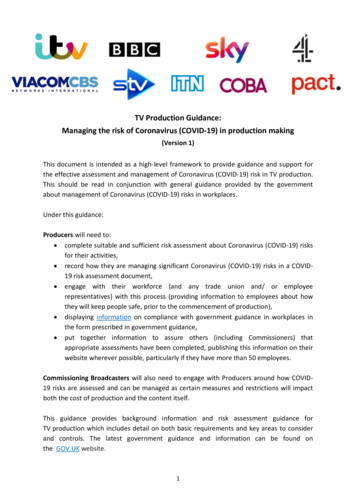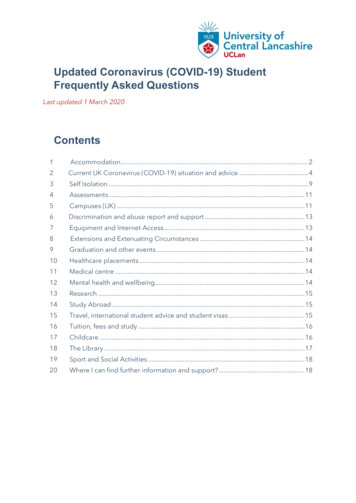Coronavirus: How You Can Support People With Dementia In Your
Coronavirus: How youcan support peoplewith dementia in yourcommunityFive top tips forindividuals volunteeringtheir time in thecoronavirus response
Foreword from our CEO, Kate LeeLiving with dementia at any time brings challenges for those withthe condition and the people close to them. Many face stigmaand isolation in everyday life and coronavirus (COVID-19) ismaking things much harder. Now more than ever, it is importantthat they get the help and support they need.If you are volunteering in your localcoronavirus response, whether for theNHS, through a community group or bysupporting a neighbour or friend, youmay be helping somebody living withdementia. This guide is for you.We have worked with people affectedby dementia to understand the uniquechallenges they face in this pandemic.This guide brings together the topfive things that you can do to supportthem during this time.You won’t always know that somebodyhas dementia, and every person’sdementia will be unique. These actionswill give you a basic understanding ofthe condition and its impact. In yourrole as a volunteer, you’re alreadydoing the most important things forpeople affected by dementia; showingkindness, patience and empathy.Thank you for the invaluable supportyou are providing to our communities.It is amazing to see so many peoplethroughout the country comingtogether to support people affectedby dementia.Kate LeeCEO of Alzheimer’s Society
Our five top tips on supporting peopleaffected by dementia, for anyonevolunteering in the coronavirus response:Become a Dementia FriendThere are many misconceptions surrounding dementia; that it’s just aboutlosing your memory or that it’s a natural part of ageing, for example. Butthere’s so much more to the condition and so much more to a person thantheir dementia. If you’re helping someone with the condition, it’s importantto have an understanding of how it can affect someone and the challengesthey might face, so you know how to best support them.Becoming a Dementia Friend simply means finding out more about howdementia affects a person – and then, armed with this understanding,doing small everyday things that help.You can join online by watching our short 5-minute video or signing up tomore in-depth interactive webinar or live streaming session.Consider how you communicateDementia can affect a person’s communication abilities. For example,a person with dementia may forget words or have problems followinga conversation. Each person will experience dementia in their own way,but there are some simple things that you can do to communicate moreeffectively in person and on the phone: Speak clearly, calmly and at a slightly slower pace if the person is havingdifficulty understanding Use short, simple sentences Be patient and give the person time to respond Try to avoid asking too many questions, or complicated questions, phrasingthem in a way which allows a ‘yes’ or ‘no’ answer If you’re supporting somebody in person, stand or sit where the person cansee and hear you as clearly as possible, and try to be at eye level If you’re supporting somebody remotely, try to use video calling, so theperson can see your facial expressions and body languageBecome a Dementia Friend dementiafriends.org.uk/join
Share information about ourDementia Connect support lineYou won’t always know that somebody has dementia and it may bea subject the person doesn’t want to discuss, so try to approach thisconversation carefully.Alzheimer’s Society is here for anyone affected by dementia,offering personalised information, support and advice through ourDementia Connect support line 0333 150 3456.Our dementia advisers are available on the phone to provide thesupport needed. They can help with things like connecting you to localgroups, helping to understand dementia and coping techniques andadvice on Lasting Power of Attorney.If you are in touch with someoneaffected by dementia, you can printone of the postcards at the end ofthis guide to leave behind, send in thepost, or pop through the letterbox.
Share information aboutsupport available to carersCoronavirus is also adding to the challenges faced by carers. Many maybe social isolating with the person living with dementia or caring for othersfrom afar.Somebody may tell you about their caregiving responsibilities and ask foradditional support.We’ve got lots of information on our website they might find useful,including a carers guide.You can also signpost carers to Dementia Connect Talking Point. It’s ourhelpful online community where anyone who is affected by dementiacan receive valuable support. It’s free, open day or night, and has lotsdiscussion and experiences specific to coronavirus.Share Dementia Connect TalkingPoint with anybody who might benefitfrom sharing their experience withother people affected by dementia:alzheimers.org.uk/talkingpoint
Share tips on staying busy andactive at homeKeeping active and purposeful when staying at home will fight off boredomand frustration. It may also help a person living with dementia retain skillsand independence for longer. If somebody you are supporting tells you theyare struggling to stay occupied, there are lots of activities you can suggest: If the person enjoys music, the website BBC Music Memories can helppeople with dementia reconnect with their most powerful memories If the person has a garden you could encourage them to get outside –they could plant some seeds and look forward to seeing them grow’ Love to Move is a seated gymnastics programme for people living withdementia. You can download a pack from their website to try activitiesat home Puzzles and games that keep the mind active and engaged can be helpful,and a good distraction from the news. Our online shop has a variety ofproducts specifically for people with dementia You can create home versions of somebody’s favourite sports, like ten pinbowling with plastic bottles, or using rolled up socks to play indoor bowls.There are so many more ideason Alzheimer’s Society’s website:alzheimers.org.uk/covid-activities
Print and cut out our Dementia Connect support postcards, for anybody who you think might need extra support.Alzheimer's Society is here to supporteveryone affected by dementia.If you are living with dementia or are concerned for a loved one,especially during the coronavirus outbreak, we’re here for you.Call our Dementia Connect support line for the supportand advice you need:0333 150 3456 (open every day)Visit our websitealzheimers.org.ukAlzheimer's Society is here to supporteveryone affected by dementia.If you are living with dementia or are concerned for a loved one,especially during the coronavirus outbreak, we’re here for you.Call our Dementia Connect support line for the supportand advice you need:0333 150 3456 (open every day)Visit our websitealzheimers.org.uk
Alzheimer’s Society is the UK’s leading dementia charity. Weprovide information and support, improve care, fund research,and create lasting change for people affected by dementia.Keeping safe whilst volunteeringIt is important to keep yourself and others safe whilst volunteering.If you find somebody in immediate danger, always call 999.If you think somebody is at risk or is being abused, contact your localauthority safeguarding team.When supporting others, please ensure you follow the latest governmentadvice on coronavirus and social distancing.If someone you’re supporting needs help with other tasks or additionalsupport, make sure to refer them to the NHS GoodSAM patient referralscheme: goodsamapp.org/NHSreferralBecome a Dementia Frienddementiafriends.org.uk/joinDementia Connect support line0333 150 3456Staying active at home ideasalzheimers.org.uk/covid-activitiesDementia Connect Talking Pointalzheimers.org.uk/talkingpoint Alzheimer’s Society 2020.All rights reserved. Except for personal use,no part of this work may be distributed,reproduced, downloaded, transmittedor stored in any form without the writtenpermission of Alzheimer’s Society.Alzheimer’s Society operates in England,Wales, Isle of Man and Northern Ireland.Registered charity in England and Wales(296645) and Isle of Man (1128).20045sd0300 222 red officeAlzheimer’s Society43-44 Crutched FriarsLondon EC3N 2AE
Coronavirus is also adding to the challenges faced by carers. Many may be social isolating with the person living with dementia or caring for others from afar. Somebody may tell you about their caregiving responsibilities and ask for additional support. We’ve got lots of information on our website they might find useful, including a carers guide. You can also signpost carers to Dementia .
Coronavirus germs live in people’s throats and mouths. When someone who has the coronavirus coughs or sneezes or breathes out, the germs come out of their mouth in tiny drops of water. It’s easy to get the coronavirus germs from inside your body on your hands when you touch your nose or your mouth. If the person with the coronavirus germs on their hands uses a door, the invisible germs can .
Managing the risk of Coronavirus (COVID-19) in production making (Version 1) This document is intended as a highlevel framework to provide guidance and support for - the effective assessment and management of Coronavirus (COVID19) risk in TV production. - This should be read in conjunction with general guidance provided by the government about management of Coronavirus (COVID-19) risks in .
Apr 14, 2020 · Coronavirus: Frequently Asked Questions? This is important information for you about coronavirus (COVID-19). . People have asked us lots of questions about coronavirus. We call these Frequently Asked Questions (FAQs). We answer many of
2 Current UK Coronavirus (COVID-19) situation and advice What is the current UK situation regarding Coronavirus? The current coronavirus alert level in the UK is 4, which means Covid-19 is in general circulation, transmission is high or rising and current social distancing measures and restrictions are in place. From 5 January 2021 the Government imposed a national lockdown. This means .
Questions fréquentes : COVID-19 et tuberculose Version 2, 22 avril 2020. Cette version remplace toutes les autres versions. Le nouveau coronavirus ou coronavirus 2 du syndrome respiratoire aigu sévère (SARS-CoV-2) est un nouveau coronavirus récemment découvert en 2019. Le virus est à l'origine de la maladie à coronavirus 2019 (COVID-19).
2.4. What do I have to do to keep my staff safe during coronavirus? . 37 2.5. What does an employer have to do to run a safe workplace during coronavirus?. 41 2.6. What are the specific legal duties that an employer is under in respect of work and coronavirus? .41 2.7.
We promise to keep you updated and share information as we have it. In the meantime, thank you for your patience as we all work through COVID-19 together. For the latest information on coronavirus (COVID-19) visit . coronavirus.ohio.gov. For questions about COVID-19’s effect on BWC not listed here,
May 17, 2021 · Coronavirus 2019 (COVID-19): Guidance for Travel Last updated May 18, 2021 Page 1 of 6. Coronavirus 2019 (COVID-19): Guidance for Travel . With the arrival of vaccines for COVID-19, DC residents can begin to resume leisure and other non-essential travel. This guidance provides updated reco























